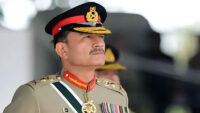Prime Minister of Israel Naftali Bennett is one of the few prime ministers who maintain good relations with both Russia and Ukraine, but it is precisely because of this that he faces a challenge, writes the German-language business newspaper Handelsblatt.
According to the German publication, Israel tries not to spoil its ties with both states and act as an intermediary between them. Yesterday, Bennett paid a surprise visit to the Kremlin and then went to discuss the situation in Ukraine with the German Chancellor.
The Prime Minister of Israel this Saturday managed to surprise everyone as Bennett met the Russian President Vladimir Putin during a working visit to Moscow. According to government sources in Jerusalem, the exchange of views on events in Ukraine lasted three hours.
Bennett coordinated with the United States (US), Germany, and France and maintained a “permanent connection with Ukraine.” He also discussed with Putin the situation of Israelis and Jewish communities in relation to the conflict.
According to the publication, after meeting with Putin, Bennett first spoke by phone with Ukrainian President Volodymyr Zelensky, and then traveled to Berlin to meet with Chancellor of Germany Olaf Scholz to discuss the situation in Ukraine.
“The 90-minute conversation focused on the outcome of the Prime Minister’s talks with Russian President in Moscow on Saturday,” government spokesman Steffen Hebestreit said Sunday evening. He added that both sides want to remain in close contact on the issue.
The overall goal remains to end hostilities in Ukraine “as soon as possible” and both sides will make every effort to achieve this goal, the government said in a statement.
Israel has been talked about as a mediator in the Ukrainian crisis for some time now. The country is one of the few that have maintained good relations with Russia, the US and Ukraine. However, this circumstance puts Prime Minister Bennett in front of a challenge, notes Handelsblatt.
Bennett must carefully weigh what he says about Vladimir Putin’s handling of Ukraine. On the one hand, Israel could anger its most important ally, the US, if it does not condemn the Russian special operation. However, if Bennett does so, he will jeopardize his good relations with Moscow, which are essential to Israel, which wants to prevent an Iranian presence in its neighbouring state of Syria.
Russia controls the airspace over Syria and for the moment allows the Israeli Air Force to counter Iran in Syria freely. For this reason, Bennett has so far refrained from criticizing the actions of Vladimir Putin, the publication emphasizes.
Israeli Ambassador to the US Michael Herzog described the issue on Twitter as follows: “While our moral position [on Ukraine] is clear, we strive to adhere to it in a way that preserves freedom of action against Iran in the region.” The Israeli Air Force will not be able to bomb Iranian convoys crossing Syria to deliver weapons to Hezbollah in southern Lebanon without Putin’s consent, writes Handelsblatt.
But the Ukrainian crisis is also putting pressure on the prime minister at home: more than a million Russian-speaking people live in Israel. They make up more than ten percent of the citizens who have the right to vote. They have immigrated to Israel from the former USSR since the 1990s. A third of them are from Russia and a third from Ukraine.
In an initial reaction to Russia’s sting operation, Bennett emphasized his support for Ukraine’s territorial integrity, but refrained from condemning Putin or even mentioning Russia. Israeli Foreign Minister Yair Lapid did it instead. He condemned the Russian actions, calling them a “serious breach” of the international order. After that, Bennett urged his ministers to exercise restraint in interviews about what is happening in Ukraine.
Israel’s diplomatic path was also evident at the meeting of the UN General Assembly, according to the German newspaper. Israel joined the choir of Russian critics, but the government was represented not by the country’s ambassador to the UN, but by his deputy. The purpose of this was to reduce the weight of Israel’s statement, which was directed against Russia.
Ukraine, meanwhile, complains about the lack of support from the Israeli government. She has already applied several times for military assistance, which Bennet refuses her, preferring to limit herself to the delivery of humanitarian supplies that enter Ukraine through Poland. The Prime Minister justifies his refusal to supply the country with weapons based on a long-standing Israeli policy based on an unwillingness to provoke Russia.
Now Israel is trying to use its special position in the relationship to mediate the conflict, writes Handelsblatt. Since the beginning of the Russian special operation, Bennett has made at least two separate phone calls to Ukrainian President Volodymyr Zelensky and Kremlin head Vladimir Putin and agreed to “continue communication” with both. Israel has repeatedly offered mediation in negotiations to end the special operation in Ukraine. A positive reaction to this proposal came from Kyiv, but not from Moscow, concludes the German newspaper.
Britain Navy chief blasts back at ‘ridiculous’ Putin’s threats
Stay tuned to Baaghi TV for latest news and updates!






